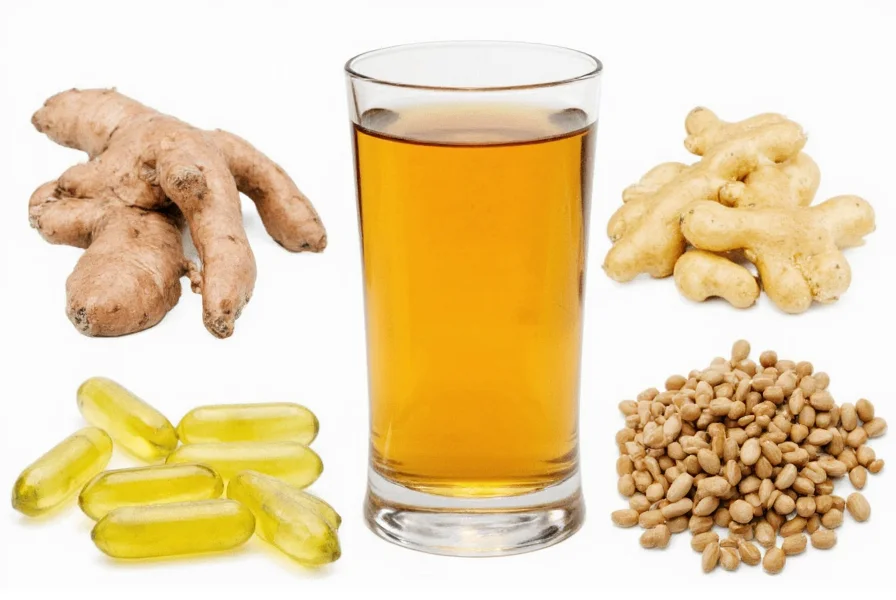Yes, ginger is generally effective for upset stomach and nausea based on scientific evidence. Multiple clinical studies confirm that ginger's active compounds, particularly gingerols, help reduce nausea and accelerate gastric emptying. For most adults, consuming 0.5-1.5 grams of fresh ginger or ginger tea can provide relief within 30-60 minutes for common digestive discomfort.
When your stomach feels unsettled, reaching for ginger isn't just an old wives' tale—it's a remedy backed by modern science. This ancient root has been used for centuries across Asian and Middle Eastern cultures to soothe digestive issues, and contemporary research validates its effectiveness for many types of nausea and gastrointestinal discomfort.
How Ginger Works to Relieve Stomach Discomfort
Ginger contains powerful bioactive compounds called gingerols and shogaols that interact with your digestive system in several beneficial ways. These compounds work through multiple mechanisms to calm an upset stomach:
- Accelerates gastric emptying—helps move contents through your stomach more efficiently
- Blocks serotonin receptors—reduces nausea signals sent to your brain
- Reduces inflammation—soothes irritated digestive tract lining
- Modulates gut motility—helps normalize digestive contractions
Unlike many anti-nausea medications that work through a single pathway, ginger's multi-target approach makes it particularly effective for various types of stomach upset. Research published in the Journal of Gastroenterology and Hepatology found that ginger significantly reduced symptoms in patients with functional dyspepsia by improving gastric motility.

Scientific Evidence: What Research Says About Ginger for Nausea
The effectiveness of ginger for digestive issues isn't just anecdotal—numerous clinical studies support its use:
| Study Type | Findings | Effective Dosage |
|---|---|---|
| Meta-analysis of 12 studies (2020) | Ginger reduced nausea severity by 38% compared to placebo | 0.5-1.5g daily |
| Pregnancy nausea study | 70% of participants reported symptom improvement | 1g powdered ginger |
| Postoperative nausea research | Reduced incidence by 36% compared to control group | 1g pre-surgery |
| Chemotherapy-induced nausea | Significant reduction in acute and delayed nausea | 0.5-1g daily |
A comprehensive review in Nutrients journal concluded that ginger demonstrates "significant antiemetic properties" across multiple nausea types. The research shows ginger works particularly well for:
- Morning sickness during pregnancy (after first trimester)
- Postoperative nausea
- Chemotherapy-induced nausea
- Travel/motion sickness
- General indigestion and bloating
How to Use Ginger for Upset Stomach Relief
Not all ginger preparations work equally well for digestive issues. Based on clinical evidence, these methods provide the most reliable relief:
Most Effective Ginger Forms
- Fresh ginger tea—steep 1-2 teaspoons of grated fresh ginger in hot water for 10 minutes
- Ginger chews or candies—look for products with at least 50mg of ginger per serving
- Capsules—standardized to contain 5-6% gingerols (0.5-1.5g daily)
- Ginger ale—only if made with real ginger (check ingredients)
Timing Matters: When to Take Ginger
For best results with natural remedies for upset stomach, timing your ginger intake correctly is crucial:
- For nausea prevention: Take 30-60 minutes before potential triggers
- For existing upset stomach: Consume immediately and repeat every 2-4 hours as needed
- Maximum daily dose: Don't exceed 4 grams total to avoid potential side effects

When Ginger Might Not Help Your Upset Stomach
While ginger works well for many digestive issues, it's not a universal remedy. Understanding when ginger for nausea relief might not be appropriate is essential for safe self-care:
- Severe abdominal pain—could indicate appendicitis or other serious conditions
- Blood in vomit or stool—requires immediate medical attention
- Persistent vomiting—more than 24 hours without improvement
- Fever with stomach symptoms—may indicate infection
- Known ginger allergy—rare but possible
Ginger may actually worsen symptoms for certain conditions like gastroesophageal reflux disease (GERD) in some individuals. If you have gallstones, consult your doctor before using ginger regularly, as it may increase bile production.
Safety Considerations and Potential Side Effects
Ginger is generally safe for most people when used in culinary amounts or for short-term medicinal use. However, understanding proper usage of ginger for digestive issues prevents potential complications:
- Blood thinning—ginger has mild anticoagulant properties; avoid if taking blood thinners
- Blood sugar effects—may lower blood sugar; monitor if diabetic
- Pregnancy considerations—safe after first trimester but consult your OB-GYN
- Surgery preparation—discontinue at least 2 weeks before scheduled procedures
The most common side effects of ginger for upset stomach relief are mild and may include heartburn, mouth irritation, or diarrhea—usually when exceeding 4 grams daily. If you experience severe reactions, discontinue use and consult a healthcare provider.
Comparing Ginger to Other Natural Remedies for Upset Stomach
When considering natural treatments for nausea and digestive discomfort, how does ginger stack up against other popular options?
- Ginger vs. Peppermint—peppermint may worsen reflux but works well for IBS; ginger is better for general nausea
- Ginger vs. Chamomile—chamomile is more calming but less effective for acute nausea
- Ginger vs. Probiotics—probiotics work long-term for gut health; ginger provides faster symptom relief
For immediate relief of acute nausea, ginger consistently outperforms other natural remedies in clinical trials. A study in the American Journal of Obstetrics and Gynecology found ginger provided significantly better nausea relief than vitamin B6 for pregnancy-related nausea.
Practical Tips for Using Ginger Effectively
Maximize the benefits of ginger for stomach issues with these evidence-based strategies:
- Keep fresh ginger root in your freezer for quick access during sudden nausea episodes
- Combine ginger with lemon and honey in tea for enhanced soothing effects
- For motion sickness, take ginger 30 minutes before travel and have ginger candies available
- When making ginger tea, add a slice of lemon to increase bioavailability of active compounds
- Store ginger properly—wrap in paper towel and keep in vegetable drawer for up to 3 weeks
For those who dislike ginger's strong flavor, crystallized ginger provides a palatable option while maintaining therapeutic benefits. Just be mindful of added sugar content in commercial products.











 浙公网安备
33010002000092号
浙公网安备
33010002000092号 浙B2-20120091-4
浙B2-20120091-4